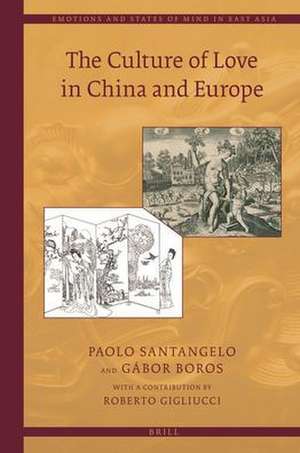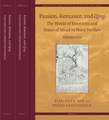The Culture of Love in China and Europe: Emotions and States of Mind in East Asia, cartea 8
Autor Paolo Santangelo, Gábor Borosen Limba Engleză Hardback – 18 dec 2019
Preț: 1069.68 lei
Preț vechi: 1304.49 lei
-18% Nou
Puncte Express: 1605
Preț estimativ în valută:
204.68€ • 214.28$ • 169.36£
204.68€ • 214.28$ • 169.36£
Carte indisponibilă temporar
Doresc să fiu notificat când acest titlu va fi disponibil:
Se trimite...
Preluare comenzi: 021 569.72.76
Specificații
ISBN-13: 9789004396869
ISBN-10: 9004396861
Dimensiuni: 155 x 235 mm
Greutate: 1.3 kg
Editura: Brill
Colecția Brill
Seria Emotions and States of Mind in East Asia
ISBN-10: 9004396861
Dimensiuni: 155 x 235 mm
Greutate: 1.3 kg
Editura: Brill
Colecția Brill
Seria Emotions and States of Mind in East Asia
Cuprins
Authors’ Preface
List of Figures
Paolo Santangelo
Introductory Notes
1 Emotions and Love. Philosophical Representation of Passions: Emotions and Human Nature in Neo-Confucian Thought
Basic Terms and Notions Concerning the Idea of “Love”
Chinese Notions Ascribable to the Concepts of Love
Passions and Love Passion (Qing)
Qing: a Short Historical Survey
The “Romantics” in the Medieval Period
The Cosmologists. The Concept of Psychophysical Nature and the Principle-Desires Scheme in the School of Principles
Wang Yangming
Rehabilitation of Emotions and Desires. Ideological Basis for a Cult of Passions
Developments of the Schools of Mind
From Ming to Qing
The Cult of Passions during the Qing Dynasty
Two Main Trends and Domestication of Passions
2 Various Facets of Love in Literary Sources
The So-Called Cult of Passions in Literary Works
The ‘True Emotions’ and ‘True Love’
Love Winning Death: Mythical and Supernatural Elements
The “Mutual Love Tree”
Destiny and Predestined Love
Two Treatises on Love: the “History of Love” (Qingshi leilüe 情史類略) and De Amore
In Search of a New Morality
Love, Desire and Lust
Seduction: Breaches, Temptations and Loneliness
The Rhetoric of Gendered Seduction
Body and Beauty: the Language of Body as Seductive Language
Love-Affection as Moral Sentiment: Conjugal Love and Its Antagonists
Gender’s Roles in Love. New and Old Images of Heroines and Heroes
Femme fatale
Illicit and Practical Loves. Love as a Food
The Dark and Surreal Sides of Love. Eros and Death
Passions are Like Dreams. Between Social Limitations and Dream Freedom
3 Concluding Remarks and Bibliography to Part 1
Concluding Remarks
Bibliography to Part 1
Gábor Boros
4 European Philosophies of Love – General Introduction
Preface
1 Historical Introduction
2 Philosophical Introduction – Sources, Ideas, Terminology
5 The Scholastic Period
1 Love of God According to Bernard of Clairvaux
2 Peter Abelard’s Calamities of Love
3 Andreas Capellanus and Love’s Labours in His On Love
4 Thomas Aquinas’ Systematised Christian Concept of Love
5 Facets of Love in Literary Sources: Courtly Love
6 Christian and Jewish, Florentine and Neapolitan Versions of Neoplatonism
1 Marsilio Ficino’s Commentaries on Plato’s Texts on Love
2 Giovanni Pico della Mirandola: a Platonic Discourse on Love – in Exposition of a Sonnet by Girolamo Benivieni
3 Leone Ebreo’s Dialogues of Love
4 The Dissolution of the Christian-Platonic Tradition of Love: Castiglione, Bruno
5 Facets of Love in Literary Sources: 14th-17th Century
7 Concepts of Love in the 17th Century
1 Concepts of Love in the Early 17th Century Religious Renovation and in the Passage from Traditional Physiology to the Mechanical Science-based Medicine (Jacques Ferrand, and Francis of Sales, Fénelon and Mme Guyon)
2 Metaphysic-based Concepts of Love in the 17th Century
8 Enlightenments: Naturalizing Concepts of Love
1 Hume’s Philosophy of Love: Sympathy Based on Experimental Natural Law
2 French Enlightenment
3 Kant’s Concepts of Love, Marriage and Friendship from Traditional Natural Law Perspective
9 The Beginnings of Romanticism
1 Facets of Love in Literary Sources: Schlegel’s and Goethe’s Respective Versions of Romantic Concepts of Love
2 Hegel and the Impossibility to Find a Place for Love within the Rational State
3 Facets of Love in Literary Sources: Stendhal On Love
4 Kierkegaard’s Ultimate Concept of Love in His The Works of Love
Bibliography to Part 2
Conclusion
Index
List of Figures
Part 1: China
Paolo Santangelo
Introductory Notes
1 Emotions and Love. Philosophical Representation of Passions: Emotions and Human Nature in Neo-Confucian Thought
Basic Terms and Notions Concerning the Idea of “Love”
Chinese Notions Ascribable to the Concepts of Love
Passions and Love Passion (Qing)
Qing: a Short Historical Survey
The “Romantics” in the Medieval Period
The Cosmologists. The Concept of Psychophysical Nature and the Principle-Desires Scheme in the School of Principles
Wang Yangming
Rehabilitation of Emotions and Desires. Ideological Basis for a Cult of Passions
Developments of the Schools of Mind
From Ming to Qing
The Cult of Passions during the Qing Dynasty
Two Main Trends and Domestication of Passions
2 Various Facets of Love in Literary Sources
The So-Called Cult of Passions in Literary Works
The ‘True Emotions’ and ‘True Love’
Love Winning Death: Mythical and Supernatural Elements
The “Mutual Love Tree”
Destiny and Predestined Love
Two Treatises on Love: the “History of Love” (Qingshi leilüe 情史類略) and De Amore
In Search of a New Morality
Love, Desire and Lust
Seduction: Breaches, Temptations and Loneliness
The Rhetoric of Gendered Seduction
Body and Beauty: the Language of Body as Seductive Language
Love-Affection as Moral Sentiment: Conjugal Love and Its Antagonists
Gender’s Roles in Love. New and Old Images of Heroines and Heroes
Femme fatale
Illicit and Practical Loves. Love as a Food
The Dark and Surreal Sides of Love. Eros and Death
Passions are Like Dreams. Between Social Limitations and Dream Freedom
3 Concluding Remarks and Bibliography to Part 1
Concluding Remarks
Bibliography to Part 1
Part 2: Europe
Gábor Boros
4 European Philosophies of Love – General Introduction
Preface
1 Historical Introduction
2 Philosophical Introduction – Sources, Ideas, Terminology
5 The Scholastic Period
1 Love of God According to Bernard of Clairvaux
2 Peter Abelard’s Calamities of Love
3 Andreas Capellanus and Love’s Labours in His On Love
4 Thomas Aquinas’ Systematised Christian Concept of Love
5 Facets of Love in Literary Sources: Courtly Love
6 Christian and Jewish, Florentine and Neapolitan Versions of Neoplatonism
1 Marsilio Ficino’s Commentaries on Plato’s Texts on Love
2 Giovanni Pico della Mirandola: a Platonic Discourse on Love – in Exposition of a Sonnet by Girolamo Benivieni
3 Leone Ebreo’s Dialogues of Love
4 The Dissolution of the Christian-Platonic Tradition of Love: Castiglione, Bruno
5 Facets of Love in Literary Sources: 14th-17th Century
7 Concepts of Love in the 17th Century
1 Concepts of Love in the Early 17th Century Religious Renovation and in the Passage from Traditional Physiology to the Mechanical Science-based Medicine (Jacques Ferrand, and Francis of Sales, Fénelon and Mme Guyon)
2 Metaphysic-based Concepts of Love in the 17th Century
8 Enlightenments: Naturalizing Concepts of Love
1 Hume’s Philosophy of Love: Sympathy Based on Experimental Natural Law
2 French Enlightenment
3 Kant’s Concepts of Love, Marriage and Friendship from Traditional Natural Law Perspective
9 The Beginnings of Romanticism
1 Facets of Love in Literary Sources: Schlegel’s and Goethe’s Respective Versions of Romantic Concepts of Love
2 Hegel and the Impossibility to Find a Place for Love within the Rational State
3 Facets of Love in Literary Sources: Stendhal On Love
4 Kierkegaard’s Ultimate Concept of Love in His The Works of Love
Bibliography to Part 2
Conclusion
Index
Notă biografică
Paolo Santangelo, is Professor emeritus of Sapienza University of Rome, and leads an international research project on the textual analysis of literary and non-literary sources in Chinese culture. He is the author of several books and articles.Gábor Boros is Philosopher at Loránd Eötvös University and Head of the Department of General Humanities at Gáspár Károli University in Budapest. He has published monographs, translations and numerous articles on early modern philosophy and philosophy of emotions, in particularly on the concepts of love.








